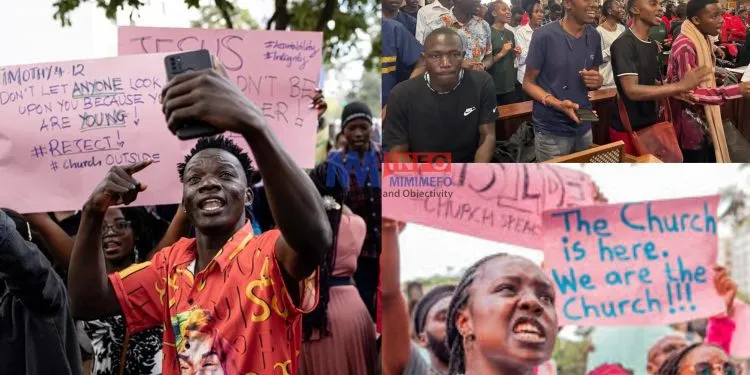The Kenyan youth-led protests against planned tax increases have jolted a powerful institution—the Church—into a profound reckoning. This nation, where over 80% of the population, including President William Ruto, identifies as Christian, has witnessed a unique and transformative youth movement.
The young demonstrators have accused the Church of siding with the government and allowing politicians to use the pulpit as a political platform. This unprecedented challenge prompted Catholic leaders to respond with a special Mass dedicated to the youth from churches in and around Nairobi, honoring those killed by police during the anti-tax protests.
On a recent Sunday afternoon, hundreds of young people gathered at the Holy Family Basilica to pray for the deceased. Just weeks earlier, the basilica had seen an unusual disruption—chants from the altar by the digitally savvy Generation Z (Gen-Z), expressing their frustration with the Church’s perceived lack of support for their campaign against tough tax hikes.
Addressing the congregation, Bishop Simon Kamomoe acknowledged the youth’s grievances. “I know as young people sometimes you feel disappointed even in the Church,” he said. “We would like to renew our commitment in serving you. We can be mistaken…May the Lord forgive us as a Church, where even before God, we have disappointed you.”
Bishop Kamomoe urged the youth to be patient in pursuing their dreams, guided by the Church, and to repent for any sins committed during the protests. “We don’t want to lose you, we don’t want to lose our young people,” he stated candidly. “The Catholic bishops are so concerned about losing this generation,” he added, emphasizing the need for peace and protection of lives.
The Mass, marked by spirited singing and boisterous cheering with Kenyan flags waving, was seen by many as a welcome yet belated first step. “I feel like for the first time, the Church is realizing that the young people are serious,” said Yebo, an anonymous protest participant. “And I feel also the Church hasn’t been really on our side. They have been sitting on the fence for a long time.”
Despite Church organizations lobbying against the tax bill, it was the overwhelming numbers of young protesters that forced President Ruto to reconsider. The Gen-Z demonstrators have been vocal about the perceived cozy relationship between Christian and political institutions, citing suspicions about visits by church leaders to the State House, even during the protests.
“We believe the president is buying the Church,” said Meshack Mwendwa. “On social media, the church leaders are seen holding envelopes alongside executive leaders and permanent members of the government. And that’s not what we want as the youth, now it’s time for a change.”
One significant change they demanded and achieved was the end of the ostentatious practice of “Harambee”—politicians giving large sums of money to the Church, which often translated into political influence on Sunday mornings. The protest movement, under the hashtag #OccupyChurch, aimed to stop this practice.
Even President Ruto, who had previously utilized the pulpit for his political messages, supported the youth’s stance. “On matters of politics on the pulpit I am 100% aligned,” he said during a media roundtable. “We shouldn’t be using the pulpit in churches or in any other places of worship, to prosecute politics. It is not right.”
Following this, President Ruto banned state officers and public servants from making public charitable donations, directing the attorney general to develop a mechanism for structured and transparent contributions.
Reverend Chris Kinyanjui, general secretary of Kenya’s National Council of Churches (NCCK), acknowledged the complexity of the situation. “Our president speaks from the pulpit. You know what the pulpit means? He cannot be questioned. So, he has become a very powerful figure in Kenya’s politics and church circles. The Gen-Z are questioning, and are saying, we don’t know the difference between the government and the church.”
Outside the basilica, as the Mass concluded, Mitchelee Mbugua highlighted the youth’s resolve. “We are the Church. If the Church shows that they don’t support us, we draw away from them. If there are no us, there’s not a Church. So, they have to listen to our grievances. Because we are the Church.”
Rev. Kinyanjui emphasised the fragility of the social contract with Kenya’s youth, noting the NCCK’s concern about Kenya potentially following Sudan’s path, where a youth revolution was aborted by a military coup leading to civil war. “We were happy that the president was able to defuse [this crisis],” he said. “If he had signed that finance bill into law, who knows what we’d have become.”
Looking forward, the NCCK aims to adopt a proactive and visible strategy, serving as the voice and conscience of society. “In a way, we see the Gen-Z as doing the Lord’s work, and I think that’s something that has made many pastors wake up.”



